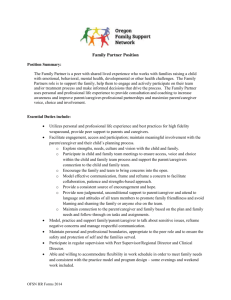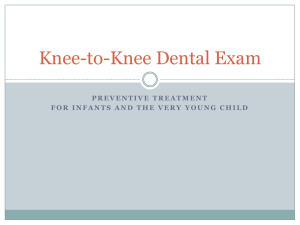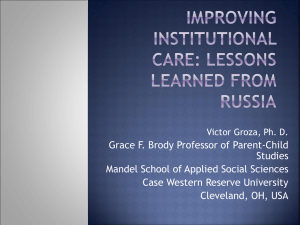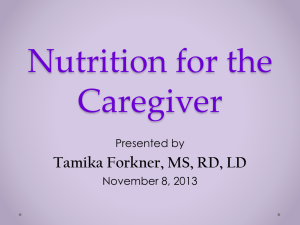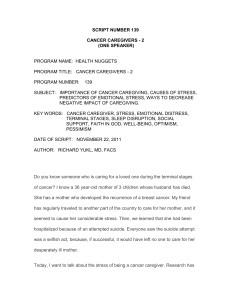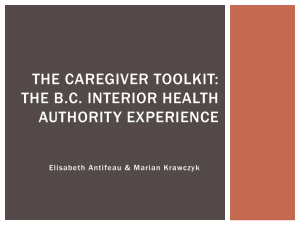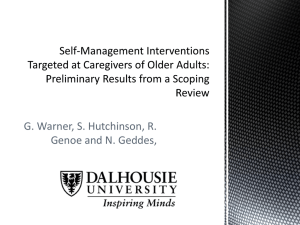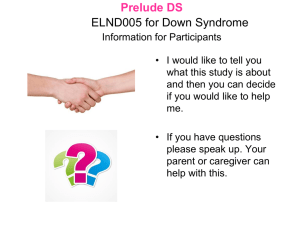REQUIREMENTS FOR CAREGIVERS UNDER 20
advertisement
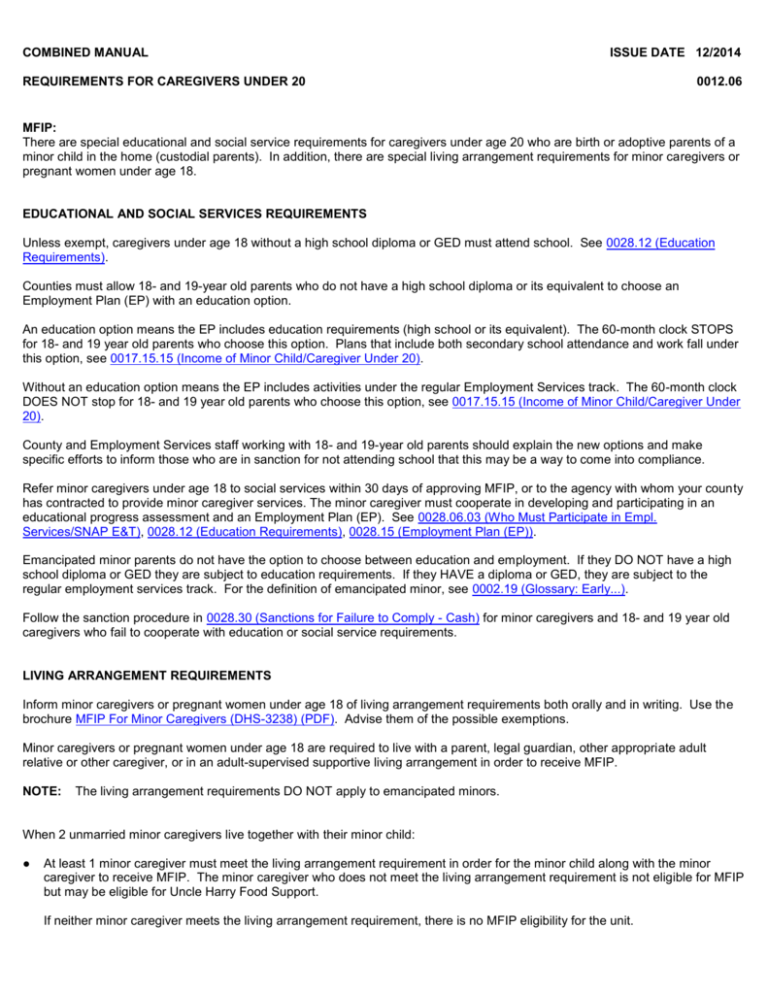
COMBINED MANUAL ISSUE DATE 12/2014 REQUIREMENTS FOR CAREGIVERS UNDER 20 0012.06 MFIP: There are special educational and social service requirements for caregivers under age 20 who are birth or adoptive parents of a minor child in the home (custodial parents). In addition, there are special living arrangement requirements for minor caregivers or pregnant women under age 18. EDUCATIONAL AND SOCIAL SERVICES REQUIREMENTS Unless exempt, caregivers under age 18 without a high school diploma or GED must attend school. See 0028.12 (Education Requirements). Counties must allow 18- and 19-year old parents who do not have a high school diploma or its equivalent to choose an Employment Plan (EP) with an education option. An education option means the EP includes education requirements (high school or its equivalent). The 60-month clock STOPS for 18- and 19 year old parents who choose this option. Plans that include both secondary school attendance and work fall under this option, see 0017.15.15 (Income of Minor Child/Caregiver Under 20). Without an education option means the EP includes activities under the regular Employment Services track. The 60-month clock DOES NOT stop for 18- and 19 year old parents who choose this option, see 0017.15.15 (Income of Minor Child/Caregiver Under 20). County and Employment Services staff working with 18- and 19-year old parents should explain the new options and make specific efforts to inform those who are in sanction for not attending school that this may be a way to come into compliance. Refer minor caregivers under age 18 to social services within 30 days of approving MFIP, or to the agency with whom your county has contracted to provide minor caregiver services. The minor caregiver must cooperate in developing and participating in an educational progress assessment and an Employment Plan (EP). See 0028.06.03 (Who Must Participate in Empl. Services/SNAP E&T), 0028.12 (Education Requirements), 0028.15 (Employment Plan (EP)). Emancipated minor parents do not have the option to choose between education and employment. If they DO NOT have a high school diploma or GED they are subject to education requirements. If they HAVE a diploma or GED, they are subject to the regular employment services track. For the definition of emancipated minor, see 0002.19 (Glossary: Early...). Follow the sanction procedure in 0028.30 (Sanctions for Failure to Comply - Cash) for minor caregivers and 18- and 19 year old caregivers who fail to cooperate with education or social service requirements. LIVING ARRANGEMENT REQUIREMENTS Inform minor caregivers or pregnant women under age 18 of living arrangement requirements both orally and in writing. Use the brochure MFIP For Minor Caregivers (DHS-3238) (PDF). Advise them of the possible exemptions. Minor caregivers or pregnant women under age 18 are required to live with a parent, legal guardian, other appropriate adult relative or other caregiver, or in an adult-supervised supportive living arrangement in order to receive MFIP. NOTE: The living arrangement requirements DO NOT apply to emancipated minors. When 2 unmarried minor caregivers live together with their minor child: ● At least 1 minor caregiver must meet the living arrangement requirement in order for the minor child along with the minor caregiver to receive MFIP. The minor caregiver who does not meet the living arrangement requirement is not eligible for MFIP but may be eligible for Uncle Harry Food Support. If neither minor caregiver meets the living arrangement requirement, there is no MFIP eligibility for the unit. COMBINED MANUAL REQUIREMENTS FOR CAREGIVERS UNDER 20 ISSUE DATE 12/2014 0012.06 ● If BOTH minor caregivers meet the living arrangement requirement, they are both eligible along with the child to receive MFIP. In addition, they must establish paternity by completing the Recognition of Parentage (ROP) or by adjudication. ● When the 2 minor caregivers live with 1 of the caregiver’s parent(s), the minor caregiver who is not related to the parental household is not eligible for MFIP, unless the county has approved this living arrangement. If the county does not approve the living arrangement, the unrelated minor caregiver is not eligible for MFIP but may get Uncle Harry Food Support. Also see 0014.03.03 (Determining the Cash Assistance Unit). If a minor caregiver or pregnant woman under age 18 claims that 1 of the exemptions listed below applies to him/her, assist the minor in obtaining the necessary verifications. Minor caregivers who meet 1 of the following criteria are exempt from the living arrangement requirements: ● The minor caregiver has no living parent, other appropriate adult relative, or legal guardian whose whereabouts are known. ● No living parent, other appropriate adult relative, or legal guardian of the minor parent allows the minor parent to live in his/her home. If a minor parent claims this exemption, refer the case to social services for an evaluation. Use the Referral of Minor Parent to Social Services (DHS-2882) (PDF). ● The minor caregiver has lived apart from his/her own parent or legal guardian for a period of at least 1 year before either the birth of the minor child or the minor parent's application for MFIP. ● The physical or emotional health or safety of the minor caregiver or minor child would be jeopardized if the minor caregiver and minor child resided in the same residence with the minor caregiver's parent(s), other appropriate adult relative, or legal guardian. If a minor caregiver claims this exemption, use the DHS-2882 to refer the case to Child Protection Services for an evaluation. A new referral is not necessary if one has been made within the last 6 months, unless there has been a significant change in circumstances which justifies a new referral and determination. ● An adult-supervised supportive living arrangement is not available for the minor caregiver and the minor child in the county in which the minor caregiver currently resides. If such an arrangement becomes available within the county, the minor caregiver and child must reside in that arrangement. If a minor caregiver is not living with a parent or legal guardian due to meeting an exemption in the 1st, 2nd, or 4th bullet above, the minor caregiver must reside, when possible, in an adult-supervised supportive living arrangement. Social services will help the minor caregiver (in consultation with the family of the minor caregiver, when appropriate) locate an appropriate adult supervised supportive living arrangement. When a minor caregiver and minor child live with the minor caregiver's parent, another adult relative, a legal guardian or legal custodian, or in an adult-supervised supportive living arrangement, MFIP must be paid, when possible, in the form of a protective payment on behalf of the minor caregiver and minor child. See 0024.09 (Protective and Vendor Payments). Re-evaluate the living arrangement at recertification and when there is a change in living arrangement or household composition. The living arrangement requirement applies ONLY through the month of the minor parent's 18th birthday. DWP: Caregivers 18 or 19 years of age WITHOUT a high school diploma or its equivalent who choose to have an Employment Plan WITHOUT an education option, follow MFIP. If only 1 parent in a 2-parent family meets these criteria, the family must participate in DWP. For more information on caregivers under 20, see 0013.05 (DWP Bases of Eligibility). SNAP, MSA, GA, GRH: No provisions.

